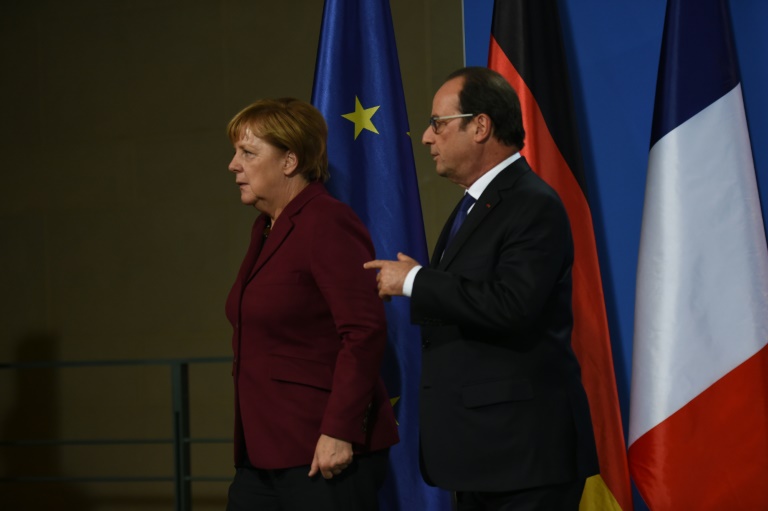
Protester demonstrate outsiude the chancellery in Berlin ahead of a meeting of leaders of Russia, Ukraine, France and Germany © AFP / SteffiI oos
Berlin, Germany, Oct 18 – German Chancellor Angela Merkel said “no miracles” were achieved on the Ukraine crisis Thursday, but talks with the country’s leader and his Russian and French counterparts did lead to some progress on ending a deadlock in the peace process.
After a five-hour summit billed as “difficult”, Ukrainian President Petro Poroshenko said all sides had agreed to draw up a roadmap for applying the frayed 2015 Minsk peace accords following months of impasse.
“Between now and the end of November we have to approve a roadmap. It will be a document on the implementation of all the Minsk accords,” he said in a press conference after the Berlin gathering, according to Russian news agencies.
German Chancellor Angela Merkel said at a separate press conference that the talks “didn’t achieve miracles” but that progress was made “with the creation of a so-called roadmap”.
“There’s much work left to do,” she added, flanked by French President Francois Hollande.

German Chancellor Angela Merkel and French President Francois Hollande leave a press conference after a meeting of the leaders of Russia, Ukraine, France and Germany © AFP / Stephane de Sakutin
Russian President Vladimir Putin, on his first visit to Berlin since the conflict erupted, stressed that the Minsk accords remained the best path towards a lasting resolution to war in eastern Ukraine.
The talks came just hours before an EU summit in Brussels over relations with Russia, where European leaders will discuss the question of sanctions over Ukraine, which come up for renewal at the end of the year.
The roadmap agreed to in Berlin will be now be further thrashed out and discussed by the countries’ foreign ministers, the leaders said.
“You have to respect the successive steps of the Minsk accords,” Hollande told reporters.
– Thorny issues –
Putin had not visited Berlin since Russia annexed Ukraine’s Crimean Peninsula in 2014, sending relations with the West plunging to their lowest point since the Cold War.

German Chancellor Angela Merkel (3L) talks to Russian President Vladimir Putin at the chancellery in Berlin © POOL/AFP / Michael Kappeler
Russia backs a separatist, pro-Moscow insurgency in eastern Ukraine that has claimed nearly 10,000 lives.
But it denies accusations that it has sent troops and weapons across its border with Ukraine to fuel the conflict.
The Minsk accords, signed in February 2015 with French and German mediation, call for a ceasefire along with a range of political, economic and social measures to end the conflict between Ukrainian troops and pro-Russian rebels.
While the accords reduced the intensity of fighting, they have failed to stop it.
On a key sticking point — the issue of holding possible local elections in rebel-run regions, Poroshenko said no polls could take place without “the unconditional withdrawal of foreign armed forces”.

Fighting in east Ukraine — which has claimed nearly 10,000 lives — has dragged on despite a peace plan brokered by Germany and France © AFP/File / Aleksey Filippov
Putin for his part wants partial autonomy for rebel-held parts of eastern Ukraine like Donbass and Lugansk, while Kiev wants reassurances that fair and free elections would be held there.
None of the four leaders meeting in Berlin had expected a breakthrough, but Germany and France had argued that it was important to return to the negotiating table more than a year after the Minsk agreements were signed.
Putin, speaking separately to reporters after the talks, was vague on the details of the roadmap but confirmed that the four were in favour of widening the role of the European OSCE observer mission.
According to Poroshenko, that meant an agreement had been reached on deploying an armed OSCE mission to the east.
Putin, who wants to assure the supply of provisions to rebel regions, said the talks had focused heavily on security matters but on humanitarian issues “we unfortunately didn’t make much progress”.
The Berlin summit was overshadowed by Moscow’s role in the Syrian civil war, which the leaders of France, Germany and Russia discussed separately after concluding the Ukraine talks.
About The Author










































